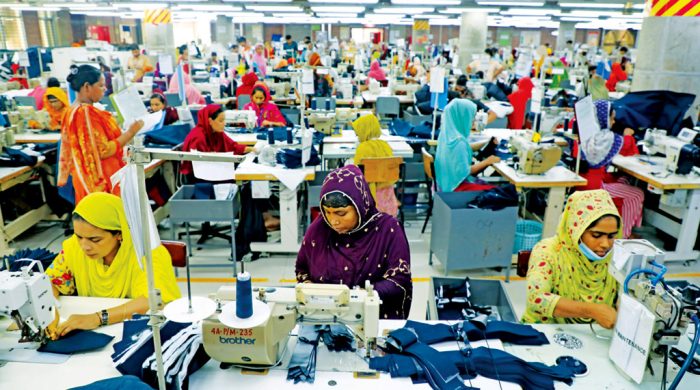Apparel exports to EU drop by 4.84pc in Jan-July

- Update Time : Saturday, September 28, 2024
- 19 Time View

Bangladesh’s apparel exports to the European Union in the first seven months, or January-July period, of 2024 declined by 4.84 per cent, which was slightly better than the overall decline of 5.22 per cent in the EU’s imports during the period.
The country’s apparel exports to the EU in the first seven months of 2024 decreased to $11.11 billion, down from $11.68 billion during the same period in 2023, according to data from the Eurostat, statistical office of the European Union.
The readymade garment imports by the EU from different countries in January-July of 2024 fell by 5.22 per cent to $49.85 billion compared with those of $52.60 billion in the same period of 2023.
Exporters said that the decline in Bangladesh’s apparel exports, although less severe than that of some of its competitors, raises concerns over the country’s ability to maintain its competitive edge on the EU market.
The decrease in imports by the EU from various countries indicated potential shifts in consumer demand and underlying economic factors affecting the overall apparel market, they said.
The Eurostat data showed that apparel imports by the EU from China in the first seven months of 2024 declined by 7.34 per cent to $12.34 billion compared with those of $13.31 billion in the same period of the past year.
Apparel imports of the EU from Turkey in January-July of 2024 declined by 8.55 per cent to $5.89 billion compared with those of $6.44 billion in the same period of 2023, the EU data showed.
India’s RMG exports to the EU in the first seven months of 2024 fell by 1.93 per cent to $2.96 billion compared with those of $3.01 billion in the same period of the previous year.
Apparel imports of the EU from Vietnam in January-June of 2024 fell by 5.07 per cent to $2.19 billion compared with those of $2.31 billion in the same period of 2023.
However, RMG exports by Cambodia to the EU in the first seven months of 2024 grew by 10.36 per cent to $2.03 billion compared with those of $1.84 billion in the same period of the previous year.
Apparel imports of the EU from Pakistan in January-June of 2024 also increased by 6.32 per cent to $2.06 billion compared with those of $1.94 billion in the same period of 2023.
Morocco’s RMG exports to the EU in the first seven months of 2024 increased by 4.04 per cent to $1.73 billion compared with those of $1.67 billion in the same period of the previous year.
According to the EU data, Cambodia and Pakistan’s performances on the EU apparel market stood in stark contrast to the overall decline in imports from many other suppliers, including Bangladesh, China and Turkey.
Experts opined that the positive growth rates of Cambodia and Pakistan indicated a potential shift in sourcing preferences within the EU, highlighting the importance of adaptability and competitiveness on that dynamic market.
The readymade garment imports by the EU from Sri Lanka in January-July of 2024 fell by 4.45 per cent to $766.90 million compared with those of $802.61 million in the same period of 2023.
Indonesia’s apparel exports to the EU in the first seven months of 2024 also fell, by 8.86 per cent, to $580.07 million compared with those of $636.47 million in the same period of the previous year.
Bangladesh’s apparel makers said that high utility costs, gas shortages and wage increases had weakened the country’s competitive position
They also said that ongoing energy shortages had restricted manufacturers’ production capacity and delayed raw material procurement resulted in extended timelines, causing delays of 20-25 days in making shipment, further impacting competitiveness.















